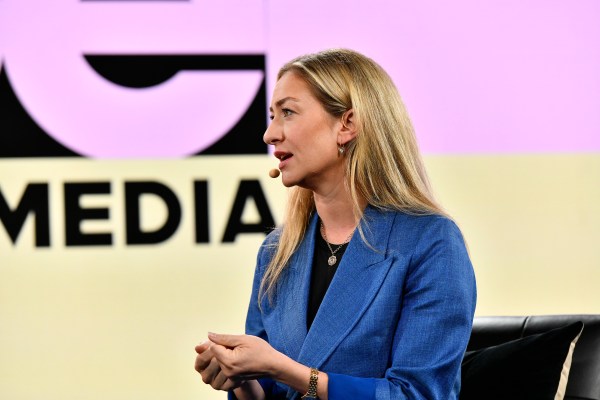Bumble, Inc. CEO Whitney Wolfe Herd believes the power of AI technology will lead to a better online dating experience for her apps’ users. Speaking at the Code Conference on Wednesday, the Bumble and Badoo exec shared how her company uses AI technology to improve matching and other aspects of the business. While she noted Bumble would not venture into more “sci-fi” areas like using AI to make virtual girlfriends or boyfriends — something other apps like Replika have done — she does see a future where AI could help play the role of digital matchmaker.
Though much of the industry is focused on novel uses of AI — like Meta’s introduction of AI chatbots and generative AI features at its event yesterday — Wolfe Herd pointed out that AI technology has actually been a big piece of Bumble’s business for years.
“I think this is something that is lost on the general public, maybe,” she said. “Because our matching algorithms are AI-driven. This is machine learning. This is how we understand relevance and compatibility,” she said.
She added that various safety measures the app uses are also powered by AI and machine learning and these areas will improve along with AI advances.
But Wolfe Herd believes that AI technology will also help to make online dating even better in the future.
“I would really think about AI as a supercharger to love and relationships,” she explained. “I want to be very clear, we are not intending on replacing humans with bots. We are not intending for people to fall in love in the sci-fi version of a digital boyfriend, girlfriend, [or] partner. What we will do, however, is we will really lead with the customers’ pain points and reducing friction, reducing things that stress a customer out,” Wolfe Herd said.
For example, she wants to leverage AI technology to help people find more compatible matches. In addition, she imagines a future where Bumble could leverage AI to train people to interact in a way that makes them feel more positive.
But the exec also hinted that there are even more innovative ways to capitalize on AI that haven’t yet been built.
“I think that’s where I’m spending a lot of my energy and time. I’m quite obsessed with AI at the moment,” Wolfe Herd said.
One example of something she’s been thinking about is building a personal matchmaker or dating coach for Bumble users that leverages AI technology. Users would tell the bot everything they wanted it to know about what’s important to them in a relationship — like their non-negotiables and values that must exist in a partner, as well as the things they like to do, how they want to spend their summer, what a typical Sunday morning looks like and so on.
This AI matchmaker could then talk to other digital matchmakers to determine two users’ compatibility.
“And only if those other matchmakers triggered a certain level of compatibility would it bring it back to the human,” Wolfe Herd explains. “So now, instead of you having to swipe and match and chat with dozens of people to find someone who’s compatible for you, you can, in fact only talk to the three people that came back as qualified individuals for what you’re looking for. So you can really leverage AI to supercharge compatibility and that’s just on the matching side of things,” she added.
Other means of using AI could involve image recognition techniques — like being able to see that someone enjoys eating at the same restaurant as you from photos — or using AI to set up dates by placing the reservation.
“I think that we are in a really interesting opportunity, in a moment, that can leverage AI and human connection, and the intersection is really fascinating,” she said.
More importantly, perhaps, is that Wolfe Herd imagines that AI will help boost Bumble’s bottom line by allowing the dating app to offer a premium experience.
Though the CEO wouldn’t put a price on the AI-powered offering, following Tinder’s reveal of a $500 per month tier, she did say that AI will allow Bumble to offer an experience that feels “very curated, very selected” and “it will definitely be at a premium to where we are now.”
